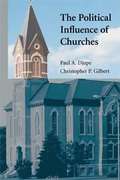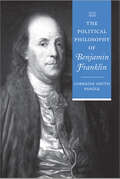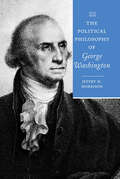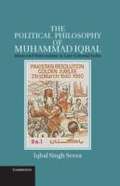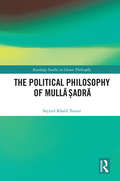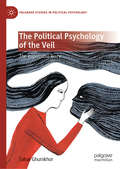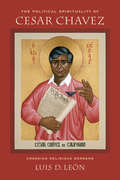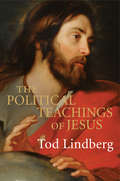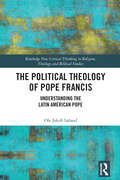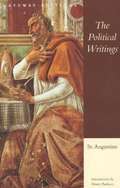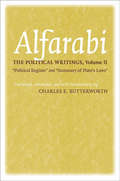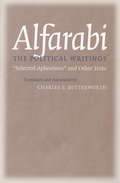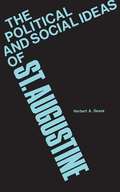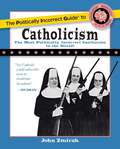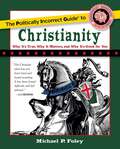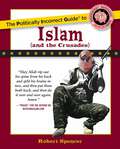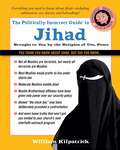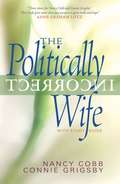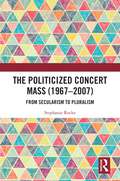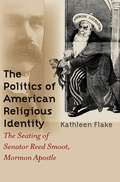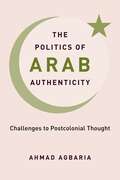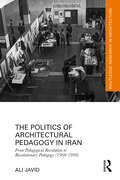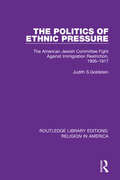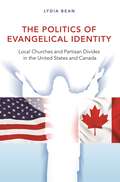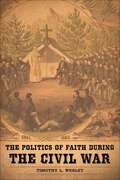- Table View
- List View
The Political Influence of Churches
by Paul A. Djupe Christopher P. GilbertDjupe and Gilbert investigate the political influence of church and how membership in organized religious bodies shapes the political life of members. Djupe and Gilbert's goal in this inquiry is to re-center scholarly attention on the voluntary association as an essential element of American civic and political life. They develop a theoretical framework that captures the multifaceted elements of church life that affect individual political attitudes and actions. Political information from clergy, small groups, and social networks flows plentifully in churches, but individuals process that information differently depending on their motivations related to their status in the church. Articulating a more fully specified model of how associations expose individuals to political information and norms will help us understand the political opinions and behavior of citizens and the contribution of that pattern to sustaining democracy.
The Political Philosophy of Benjamin Franklin (The Political Philosophy of the American Founders)
by Lorraine Smith Pangle“One of the very finest introductions to this remarkable American’s thought.” —Ralph Ketcham, Claremont Review of BooksHe invented the wood-burning stove and the lightning rod, he wrote Poor Richard’s Almanac and The Way to Wealth, and he traveled the world as a diplomat. But it was in politics that Benjamin Franklin made his greatest impact.Franklin’s political writings are full of fascinating reflections on human nature, on the character of good leadership, and on why government is such a messy and problematic business. Drawing together threads in Franklin’s writings, Lorraine Smith Pangle illuminates his thoughts on citizenship, federalism, constitutional government, the role of civil associations, and religious freedom.Of the American Founders, Franklin had an unrivaled understanding of the individual human soul. At the heart of his political vision is a view of democratic citizenship, a rich understanding of the qualities of the heart and mind necessary to support liberty and sustain happiness. This concise introduction reflects Franklin’s valuable insight into political issues that continue to be relevant today.
The Political Philosophy of George Washington (The Political Philosophy of the American Founders)
by Jeffry H. Morrison&“A delight . . . rewarding insight into Washington and his times . . . and an illuminating section on the religious outlook of this American founder.&” —Journal of American History George Washington is revered as the father of his country, a clever and skilled general, and a man of restrained principle—but not as a political thinker. This short introduction to Washington&’s political philosophy reveals him as a thoughtful public intellectual who was well equipped to lead the young United States. Though Washington left little explicit writing on political philosophy, Jeffry Morrison examines his key writings, actions, education, and political and professional lives. He finds that Washington held closely to a trinity of foundational principles—classical republicanism, British liberalism, and Protestant Christianity—with greater fidelity than many of the other founding fathers. In unearthing Washington&’s ideological growth, Morrison reveals the intellectual heritage of his political thought and shows how these beliefs motivated him to action. This insightful, concise story makes clearer the complexities of the revolutionary era and shows how the first president&’s political ideas shaped governmental institutions and instantiated the nation&’s foundational principles. &“Those who accept the &‘dumb general&’ caricature should be chastened by Morrison&’s elegant and concise sampling of Washington&’s writings . . . This work deserves to be studied and debated by political scientists, historians, and public intellectuals concerned with America&’s fundamental political principles and those of liberal democracy.&” —Review of Politics
The Political Philosophy of Muhammad Iqbal
by Iqbal Singh SeveaThis book reflects upon the political philosophy of Muhammad Iqbal, a towering intellectual figure in South Asian history, revered by many for his poetry and his thought. He lived in India in the twilight years of the British Empire and, apart from a short but significant period studying in the West, he remained in Punjab until his death in 1938. The book studies Iqbal's critique of nationalist ideology, and his attempts to chart a path for the development of the "nation" by liberating it from the centralizing and homogenizing tendencies of the modern state structure. These were highly relevant and often controversial issues during the years leading up to independence, and Iqbal frequently clashed with his contemporaries over his view of nationalism as "the greatest enemy of Islam. " In rejecting post-Enlightenment conceptions of religion, he constructed his own particular interpretation of Islam that would provide solutions to all political, social, and economic ills. In many ways, his vision of Islam - forged through an interaction with Muslim thinkers and Western intellectual traditions - was ahead of its time, and since his death both modernists and Islamists have continued to champion his legacy.
The Political Philosophy of Mullā Ṣadrā (Routledge Studies in Islamic Philosophy)
by Seyyed Khalil ToussiProviding a comprehensive and widely accessible investigation into Mullā Ṣadrā’s works, this book establishes his political philosophy and instigates a dialogue on the relevance of Ṣadrā’s philosophy to present day challenges. Investigating Ṣadrā’s primary sources, the book reveals that his discourse on politics cannot be interpreted as a discursive springboard for hierocracy and political authority of jurists, nor does the mystical attitude of his philosophy (with its emphasis on the inner aspects of religion) promote an idea of quietism or a fundamental separation of religion and politics. Laying the groundwork for further translations and interpretation, this volume is not just concerned with ‘political philosophy’ as yet another particular and limited facet of Ṣadrā’s overall system. Rather, through unifying mystical, intellectual and political aspects of this singular philosopher, the volume is concerned with properly contextualizing and understanding the guiding intentions and inspirations that unify and underlie all of his creative philosophical endeavour. This pioneering and provocative work of genuine reflection is a new contribution to the wider subject of political philosophy. It will be of interest to researchers of political philosophy, Islamic philosophy, mysticism, theology, history and Iranian studies.
The Political Psychology of the Veil: The Impossible Body (Palgrave Studies in Political Psychology)
by Sahar GhumkhorVeiled women in the West appear menacing. Their visible invisibility is a cause of obsession. What is beneath the veil more than a woman? This book investigates the preoccupation with the veiled body through the imaging and imagining of Muslim women. It examines the relationship between the body and knowledge through the politics of freedom as grounded in a ‘natural’ body, in the index of flesh. The impulse to unveil is more than a desire to free the Muslim woman. What lies at the heart of the fantasy of saving the Muslim woman is the West’s desire to save itself. The preoccupation with the veiled woman is a defense that preserves neither the object of orientalism nor the difference embodied in women’s bodies, but inversely, insists on the corporeal boundaries of the West’s mode of knowing and truth-making. The book contends that the imagination of unveiling restores the West’s sense of its own power and enables it to intrude where it is ‘other’ – thus making it the centre and the agent by promising universal freedom, all the while stifling the question of what freedom is.
The Political Spirituality of Cesar Chavez
by Luis D. LeónThe Political Spirituality of Cesar Chavez: Crossing Religious Borders maps and challenges many of the mythologies that surround the late iconic labor leader. Focusing on Chavez's own writings, León argues that La Causa can be fruitfully understood as a quasi-religious movement based on Chavez's charismatic leadership, which he modeled after Martin Luther King Jr. and Gandhi. Chavez recognized that spiritual prophecy, or political spirituality, was the key to disrupting centuries-old dehumanizing narratives that conflated religion with race. Chavez's body became emblematic for Chicano identity and enfleshed a living revolution. While there is much debate and truth-seeking around how he is remembered, through investigating the leader's construction of his own public memory, the author probes the meaning of the discrepancies. By refocusing Chavez's life and beliefs into three broad movements--mythology, prophecy, and religion--León brings us a moral and spiritual agent to match the political leader.
The Political Teachings of Jesus
by Tod LindbergLongtime political analyst and commentator Tod Lindberg goes beyond punditry to address how Jesus's words and teachings—once a radical set of ideas—have come to define our concept of government and our vision for society.
The Political Theology of Pope Francis: Understanding the Latin American Pope (Routledge New Critical Thinking in Religion, Theology and Biblical Studies)
by Ole Jakob LølandThis book explores the political dimension of Pope Francis’ theology from a variety of perspectives and makes a unique contribution to the ongoing historiography of his pontificate. It defines the concept of political theology when applied to Pope Francis’ discourse and reflects on the portrayal of him as the voice of Latin America, a great reformer and a revolutionary. The chapters offer a thorough investigation of core texts and key moments in Pope Francis’ papacy (2013-), focusing in particular on their relation to canon theory, liberation theology, the rise of populism, and gender issues. As well as documenting some of the continuities between the ideas of Pope Francis and his predecessor Benedict XVI, the author asks what the Argentinian pontiff has brought from Latin America and considers the Latin American dimension to what has become known as the ‘Francis effect’. Overall, the book demonstrates how the Pope’s words and actions constitute a powerful political theology disseminated from a unique religious and institutional position. It will be of interest to scholars of theology, religion and politics, particularly those with a focus on world Catholicism, political theology and church history.
The Political Writings of St. Augustine
by Saint Augustine Henry PaolucciThe political ideas of St. Augustine, no less than his ideas on sin, grace, and predestination, have long been an object of controversy.
The Political Writings, Volume II: "Political Regime" and "Summary of Plato's Laws"
by Charles E. Butterworth AlfarabiAlfarabi (ca. 870-950) founded the great tradition of Aristotelian/Platonic political philosophy in medieval Islamic and Arabic culture. In this second volume of political writings, Charles E. Butterworth presents translations of Alfarabi's Political Regime and Summary of Plato's "Laws" , accompanied by introductions that discuss the background for each work and explore its teaching. In addition, the texts are carefully annotated to aid the reader in following Alfarabi's argument. An Arabic-English/English-Arabic glossary allows interested readers to verify the way particular words are translated. Throughout, Butterworth's method is to translate consistently the same Arabic word by the same English word, rendering Alfarabi's style in an unusually faithful and yet approachable manner. Political Regime consists of two parts. One focuses on nature and natural existing things as well as the principles beyond nature that guide the existing things. In the second part, the exposition centers on human beings and their place in the larger cosmic whole as well as on how a proper organization of human life in political association provides the conditions whereby human beings might achieve their purpose. Summary of Plato's "Laws" gives an account of the first nine books of Plato's Laws. Alfarabi explains Plato's art of writing in general and the method he follows in writing the Laws in particular. Unlike Alfarabi's other works, which examine the place of legislation and laws in the broader context of political philosophy, the Summary is a more specialized study of the question of laws and how and why they are formulated, with a particular focus on the relevance of Plato's investigation concerning Greek divine laws for the study and understanding of all divine laws.
The Political Writings: "Selected Aphorisms" and Other Texts
by Charles E. Butterworth AlfarabiAlfarabi was among the first to explore the tensions between the philosophy of classical Greece and that of Islam, as well as of religion generally. His writings, extraordinary in their breadth and deep learning, have had a profound impact on Islamic and Jewish philosophy. This volume presents four of Alfarabi's most important texts, making his political thought available to classicists, medievalists, and scholars of religion and Byzantine and Middle Eastern studies. In a clear prose translation by Charles E. Butterworth, these treatises provide a valuable introduction to the teachings of Alfarabi and to the development of Islamic political philosophy. All of these texts are based on new Arabic editions. Two of the texts--Book of Religion and Harmonization of the Two Opinions of the Two Sages: Plato the Divine and Aristotle--appear in English for the first time. The translations of the other two works--Selected Aphorisms and chapter five of the Enumeration of the Sciences--differ markedly from those previously known to English-language readers. Butterworth situates each essay in its historical, literary, and philosophical context. His notes help the reader follow Alfarabi's text and identify persons, places, and events. English-Arabic and Arabic-English glossaries of terms further assist the reader.
The Political and Social Ideas of St. Augustine
by Herbert A. DeaneHerbert A. Deane discusses St. Augustine's views on humankind, society, and the state, in terms of Augustine's theological, political, and social thought. Deane writes in his Preface that Augustine did not have a systematic philosophy. Because of this, the author's writes that his second aim of his book is to organize his ideas into the above categories. Deane, not only elucidates Augustine's thought clearly, he also substantiates his elucidation with massive quotations from Augustine's writings and from the writings of other philosophers, theologians, and political and social analysts and critics. The following quotations are taken from the back cover of the book: In describing Augustine, the author captures the essence of the man in these words: "Genius he had in full measure . . . he is the master of the phrase or the sentence that embodies a penetrating insight, a flash of lightning that illuminates the entire sky; he is the rhetorician, the epi-grammist, the polemicist, but not the patient, logical systematic philosopher." "Professor Deane has been remarkably successful in keeping different facets of Augustine's multi-dimensional thought in view . . . [he] significantly contributes both to historical understanding of Augustine's political thinking and to appreciation of its permanent relevance to the moral dilemmas of politics."
The Politically Incorrect Guide to Catholicism (The Politically Incorrect Guides)
by John ZmirakBack by popular demand, the bestselling Politically Incorrect Guides provide an unvarnished, unapologetic overview of controversial topics every American should understand. The Politically Incorrect Guide to Catholicism refutes misrepresentations and misconceptions about the Catholic Church and separates rumor from truth when it comes to Catholic traditions, faith, and controversial leaders.
The Politically Incorrect Guide to Christianity (The Politically Incorrect Guides)
by Michael P. FoleyBack by popular demand, the bestselling Politically Incorrect Guides provide an unvarnished, unapologetic overview of controversial topics every American should understand. The Politically Incorrect Guide to Christianity offers answers to the secular world's criticism of Christianity's history, traditions, and beliefs.
The Politically Incorrect Guide to Islam: (and The Crusades) (The Politically Incorrect Guides)
by Robert SpencerIslam expert Robert Spencer reveals Islam's ongoing, unshakable quest for global conquest and why the West today faces the same threat as the Crusaders did--and what we can learn from their experience.A clarion call for the defense of the West before it is too late." -- Ibn Warraq, author"A much-needed antidote to the poisonous propaganda that compromises our current battle against jihadist murder." -- Bruce Thornton, historian"An enormous amount of well-researched material. Throws the ball back into the camp of Arabist historians." -- Walid Phares, terror analyst"Assails, with much erudition, the taboos imposed by the Politically Correct League." -- Bat Ye'or, historian"The courageous Robert Spencer busts myths and tells truths about jihadists that no one else will tell." -- Michelle Malkin, bestselling author and columnist
The Politically Incorrect Guide to Jihad (The Politically Incorrect Guides)
by William KilpatrickBack by popular demand, the bestselling Politically Incorrect Guides provide an unvarnished, unapologetic overview of the topics every American needs to know. The Politically Incorrect Guide to Jihad delves into the dark world of radical Islam, exposing the most violent menace of the 21st century.
The Politically Incorrect Wife: God's Plan for Marriage Still Works Today
by Nancy Cobb Connie GrigsbyJust what is a politically incorrect wife? She is a woman who is married to her husband and not to popular American culture. The politically incorrect wife does not buy into the stifling modern-day thinking that says, "Look out for number one. Treat your husband no better than he treats you. " Instead, she cultivates a joyful marriage using transformational spiritual principles. As formerly politically correct wives with miserable marriages, popular speakers and authors Nancy Cobb and Connie Grigsby lead readers confidently beyond the picket lines of the politically correct -- into a warm, rewarding marriage.
The Politicized Concert Mass (1967-2007): From Secularism to Pluralism
by Stephanie RockeSince the transformative 1960s, concert masses have incorporated a range of political and religious views that mirror their socio-cultural context. Those of the long 1960s (c1958-1975) reflect non-conformism and social activism; those of the 1980s, environmentalism; those of the 1990s, universalism; and those of the 2000s, cultural pluralism. Despite utilizing a format with its roots in the Roman Catholic liturgy, many of these politicized concert masses also reflect the increasing religious diversification of Western societies. By introducing non-Catholic and often non-Christian beliefs into masses that also remain respectful of Christian tradition, composers in the later twentieth century have employed the genre to promote a conciliatory way of being that promotes the value of heterogeneity and reinforces the need to protect the diversity of musics, species and spiritualities that enrich life. In combining the political with the religious, the case studies presented pose challenges for both supporters and detractors of the secularization paradigm. Overarchingly, they demonstrate that any binary division that separates life into either the religious or the secular and promotes one over the other denies the complexity of lived experience and constitutes a diminution of what it is to be human.
The Politics of American Religious Identity
by Kathleen FlakeBetween 1901 and 1907, a broad coalition of Protestant churches sought to expel newly elected Reed Smoot from the Senate, arguing that as an apostle in the Church of Jesus Christ of Latter-day Saints, Smoot was a lawbreaker and therefore unfit to be a lawmaker. The resulting Senate investigative hearing featured testimony on every peculiarity of Mormonism, especially its polygamous family structure. The Smoot hearing ultimately mediated a compromise between Progressive Era Protestantism and Mormonism and resolved the nation's long-standing "Mormon Problem." On a broader scale, Kathleen Flake shows how this landmark hearing provided the occasion for the country--through its elected representatives, the daily press, citizen petitions, and social reform activism--to reconsider the scope of religious free exercise in the new century.Flake contends that the Smoot hearing was the forge in which the Latter-day Saints, the Protestants, and the Senate hammered out a model for church-state relations, shaping for a new generation of non-Protestant and non-Christian Americans what it meant to be free and religious. In addition, she discusses the Latter-day Saints' use of narrative and collective memory to retain their religious identity even as they changed to meet the nation's demands.
The Politics of Arab Authenticity: Challenges to Postcolonial Thought
by Ahmad AgbariaBy the beginning of the 1970s, the modernizing political and cultural movements that had dominated the postwar Arab world were collapsing. The postcolonial project they had fashioned, which sought to create a decolonized order and a new Arab man, had suffered a shattering defeat in the wake of the Arab-Israeli War in 1967. Disillusioned with modern ideologies that presented the past as a burden from which postcolonial societies must be liberated, a growing number of Arab thinkers began to reconsider their cultural heritage.The Politics of Arab Authenticity illuminates how Arab societies and their leading intellectuals responded to the collapse of the postcolonial project. Ahmad Agbaria tells the story of a generation of postcolonial thinkers and activists who came to question their modernist commitments and biases against their own culture. He explores the rise of a new class of postcolonial critics who challenged and eventually superseded the old guard of Arab nationalists. Agbaria analyzes the heated cultural and intellectual debates that overtook the Arab world in the 1970s, uncovering why major figures turned to tradition in search of solutions to postcolonial predicaments. With balanced attention to cultural debates and intellectual biographies, this book offers a nuanced understanding of major cultural trends in the contemporary Arab world.
The Politics of Architectural Pedagogy in Iran: From Pedagogical Revolution to Revolutionary Pedagogy (1960-1990) (Routledge Research in Architecture)
by Ali JavidThe Politics of Architectural Pedagogy in Iran explores the evolution of architectural pedagogy during two significant socio-political upheavals in Iran: The White Revolution (1963) and the Islamic Revolution (1979). It examines how these transformative periods influenced the field, providing valuable insights into the intersection of architectural education and broader socio-political shifts in Iran.By examining the critical role of education in achieving geopolitical objectives during the Cold War, this book explores architectural pedagogy as an agent for resistance and revolution. It highlights how architectural pedagogy not only reflects radical ideologies but also actively engages in socio-political transformation. The book uncovers how architectural pedagogy became one of the mechanisms to accomplish revolutionary goals. This is evident in initiatives like the "Pedagogical Revolution" during the White Revolution (1963), aimed at modernizing educational institutions, and the "Revolutionary Pedagogy" during the Islamic Revolution (1979), which sought to serve the masses and the religious revolutionary society. In this way, the book adds a new geopolitical perspective to the contemporary discourse of radical pedagogies.This book explores the intricate connections between architectural pedagogy and politics through a transdisciplinary approach. It analyzes original multilingual documents, including political agendas, cultural agreements, curricula, teaching methods, student works, exhibitions, and conferences. It will be of interest to architectural historians and architecture students, particularly those interested in Global South development, modernism, architectural pedagogy, international relations, and Middle Eastern studies.
The Politics of Ethnic Pressure: The American Jewish Committee Fight Against Immigration Restriction, 1906-1917
by Judith S GoldsteinOriginally published in 1990, The Politics of Ethnic Pressure examines and evaluates the lobbying activities of the American Jewish Committee (AJC) between 1906 and 1917. The AJC worked to confront two specific problems: the outbreak of a series of programs against the Jews in Russia, and the campaign of the restrictionists in the United States who sought to impede the entry of the "new immigrants" from eastern and southern Europe. This book focuses on the lobbying activities of the AJC with respect to these issues, and puts forward key questions as to why they cared about the Russian problem, how they viewed their place within American society, and how they lobbied on behalf of their Jewish interests.
The Politics of Evangelical Identity: Local Churches and Partisan Divides in the United States and Canada
by Lydia BeanA comparative look at evangelical churches across the U.S.-Canada border that reveals deep political differencesIt is now a common refrain among liberals that Christian Right pastors and television pundits have hijacked evangelical Christianity for partisan gain. The Politics of Evangelical Identity challenges this notion, arguing that the hijacking metaphor paints a fundamentally distorted picture of how evangelical churches have become politicized. The book reveals how the powerful coalition between evangelicals and the Republican Party is not merely a creation of political elites who have framed conservative issues in religious language, but is anchored in the lives of local congregations.Drawing on her groundbreaking research at evangelical churches near the U.S. border with Canada—two in Buffalo, New York, and two in Hamilton, Ontario—Lydia Bean compares how American and Canadian evangelicals talk about politics in congregational settings. While Canadian evangelicals share the same theology and conservative moral attitudes as their American counterparts, their politics are quite different. On the U.S. side of the border, political conservatism is woven into the very fabric of everyday religious practice. Bean shows how subtle partisan cues emerge in small group interactions as members define how "we Christians" should relate to others in the broader civic arena, while liberals are cast in the role of adversaries. She explains how the most explicit partisan cues come not from clergy but rather from lay opinion leaders who help their less politically engaged peers to link evangelical identity to conservative politics.The Politics of Evangelical Identity demonstrates how deep the ties remain between political conservatism and evangelical Christianity in America.
The Politics of Faith during the Civil War
by Timothy L. WesleyIn The Politics of Faith during the Civil War, Timothy L. Wesley examines the engagement of both northern and southern preachers in politics during the American Civil War, revealing an era of denominational, governmental, and public scrutiny of religious leaders. Controversial ministers risked ostracism within the local community, censure from church leaders, and arrests by provost marshals or local police. In contested areas of the Upper Confederacy and Border Union, ministers occasionally faced deadly violence for what they said or would not say from their pulpits. Even silence on political issues did not guarantee a preacher's security, as both sides arrested clergymen who defied the dictates of civil and military authorities by refusing to declare their loyalty in sermons or to pray for the designated nation, army, or president. The generation that fought the Civil War lived in arguably the most sacralized culture in the history of the United States. The participation of church members in the public arena meant that ministers wielded great authority. Wesley outlines the scope of that influence and considers, conversely, the feared outcomes of its abuse. By treating ministers as both individual men of conscience and leaders of religious communities, Wesley reveals that the reticence of otherwise loyal ministers to bring politics into the pulpit often grew not out of partisan concerns but out of doctrinal, historical, and local factors.The Politics of Faith during the Civil War sheds new light on the political motivations of homefront clergymen during wartime, revealing how and why the Civil War stands as the nation's first concerted campaign to check the ministry's freedom of religious expression.
